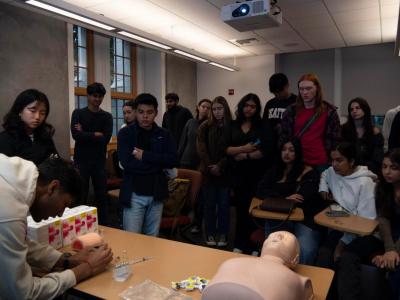Clarivate announces Highly Cited Researchers 2024
More than 30 scientists have been named to the Clarivate Highly Cited Researchers 2024 list for work conducted over the past few years at the UW School of Medicine or the Fred Hutch Cancer Center.
Dengue fever spiked to record levels in 2024: Climate change will make it even worse
Dengue fever, a potentially fatal virus spread by mosquitoes, is sweeping across the Americas, breaking records with a skyrocketing rate of infections.
Student-led organization activating community to tackle the opioid crisis
Shubham Bansal and other students founded Narcare in 2023 as an independent nonprofit organization based in Washington. It has since expanded nationwide with various chapters advocating for increased accessibility to naloxone in communities.
For Heidi van Rooyen, equitable partnerships are at the center of global health leadership
Heidi van Rooyen didn’t pursue a degree in public health, but it came knocking on her door all the same. “In a way, public health found me,” she said. It found her growing up in South Africa. From a young age, van Rooyen had a sharp awareness of health inequities that resulted from apartheid.
New Year, New Students, New Possibilities for DGH
The Department of Global Health (DGH) is honored to welcome 45 new students to our community. Of the 45 students, six are joining the Pathobiology PhD program, nine are beginning their studies in the PhD in Global Health Metrics and Implementation Science program, and 30 are entering the Master of Global Health program.
DGH Welcomes New Chair, Heidi van Rooyen
On October 1, Heidi van Rooyen began her appointment as the Chair of the Department of Global Health (DGH). Van Rooyen is an internationally recognized and accomplished South African scholar.
Q&A: After developing a better way to count homelessness, UW researchers discuss how more accurate data can help providers and people
America’s homeless services system relies on a massive amount of data, and at first glance, that data is exacting. Federal reports describe the country’s unhoused population in granular detail, listing precisely how many people are experiencing homelessness in each city along with detailed demographic data.
Lancet report goal: Halve premature mortality by 2050
A report published this month in The Lancet focuses on a global concern: premature death. It argues, optimistically, that countries can cut their populations’ risk of premature death in half by 2050, if they choose. A UW Medicine coauthor gives context to data showing poor U.S. progress on the metric, relative to other nations’ rates.
Bird flu cases in people quietly tick up, with dozens reported across 6 states
Four new cases of avian influenza were detected in farmworkers in Washington state this week, the latest in a drumbeat of human infections cropping up across the U.S. as the virus continues to spread among farm animals.





